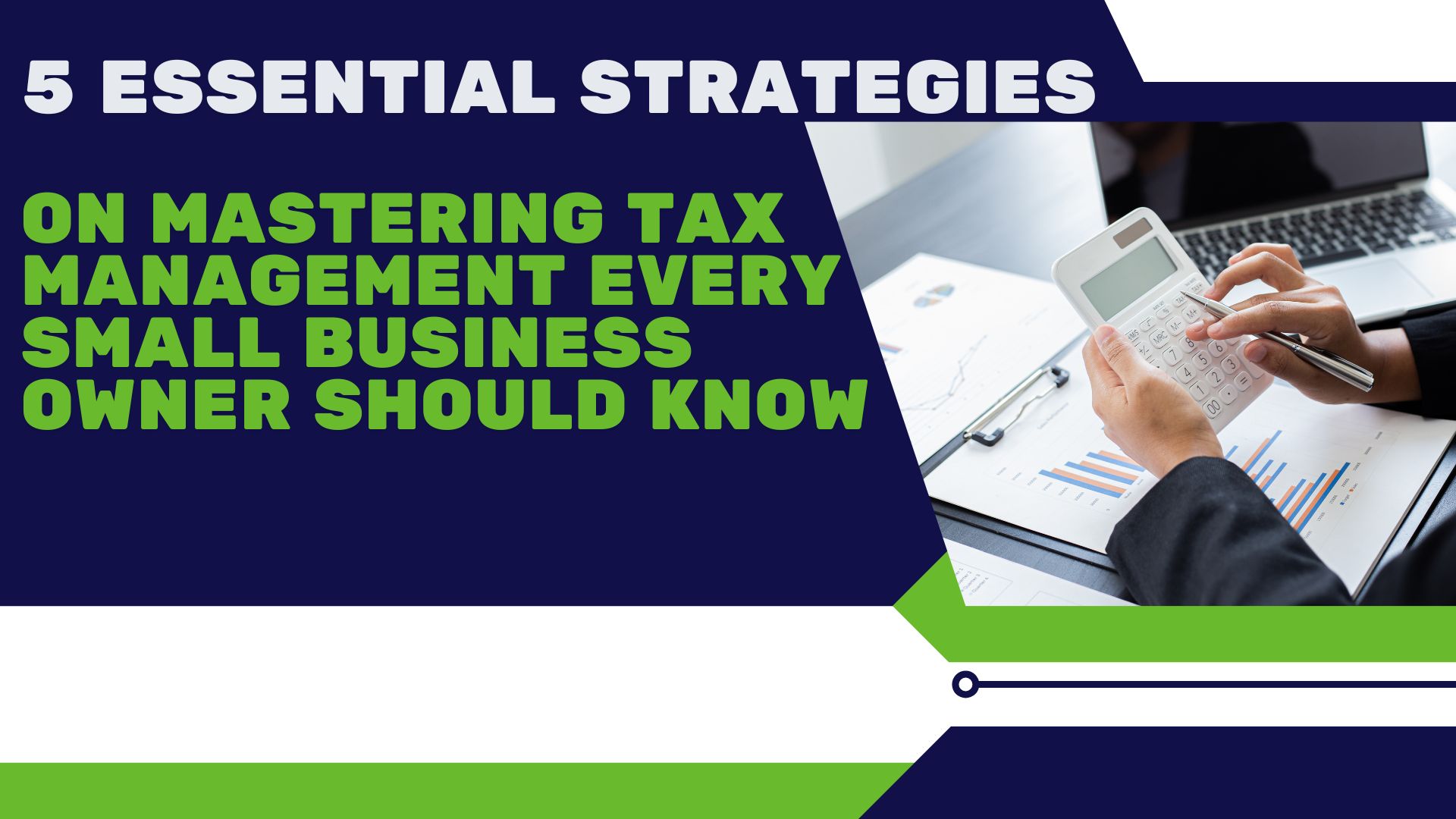Mastering Tax Management: Essential Strategies Every Small Business
Mastering Tax Management: Essential Strategies Every Small Business Owner Should Know
For many small business owners and entrepreneurs, navigating taxation and accounting can feel overwhelming. Yet, the truth is that effective tax management is one of the most powerful tools in achieving business growth. The right strategies not only ensure compliance but also optimize your finances, allowing for reinvestment and operational efficiency. By mastering the essentials of tax management, you’re giving your business a strong financial foundation for scaling. In this guide, we’ll explore five actionable strategies that every small business owner should know—offering clear insights, examples, and SmallBiztips that will simplify your approach to tax management.
1. Keep Flawless Records and Track Every Expense
Every expense matters when it comes to tax management. By diligently recording all business expenses—from office supplies to client lunches—you can reduce taxable income and discover opportunities for savings. Many small business owners often overlook minor expenses, thinking they’re too small to matter. However, these small costs add up, and when accurately tracked, they become valuable deductions during tax season.
To make this process seamless, consider using expense-tracking software like QuickBooks or FreshBooks, which integrates with your accounting needs and allows you to categorize expenses with ease. Not only does this prevent missed deductions, but it also simplifies record-keeping should you ever face an audit. For instance, say you’re in consulting services and travel frequently to meet clients. Tracking vehicle mileage and travel expenses is crucial—each trip becomes a potential deduction under business mileage, effectively lowering your taxable income and freeing up more resources for business growth.

2. Choose the Right Business Structure
The legal structure of your business has a significant impact on how much you’ll pay in taxes and how profits are allocated. When it comes to small businesses, the choice usually falls between operating as a sole proprietorship, an LLC (Limited Liability Company), or an S-Corp. Each has its own set of tax implications.
For instance, as a sole proprietor, you’re responsible for paying self-employment tax, which includes Social Security and Medicare, on all profits. In contrast, an S-Corp allows small business owners to split income between a salary and dividends, potentially lowering the total amount subject to self-employment taxes. For example, a small design studio operating as an LLC may choose to convert to an S-Corp once its revenue surpasses a certain threshold to enjoy the tax savings.
If you’re not sure which structure aligns best with your business growth goals, consulting a tax professional is a smart investment. This decision can have lasting impacts on your tax obligations, making it essential to select a structure that matches both your current needs and future aspirations.
3. Take Full Advantage of Business Deductions
Maximizing deductions is one of the most effective ways to lower your tax burden. Deductions reduce the amount of taxable income, which in turn reduces the total tax due. The list of potential deductions is extensive and includes everything from office supplies and equipment purchases to marketing costs and business-related travel expenses. Even if you’re running a small home-based business, the home office deduction can offer significant savings.
The key here is to ensure you understand and claim all eligible deductions without crossing into areas that could trigger red flags with the IRS. For instance, if you’re an entrepreneur in a service industry and often meet clients for lunch, that expense is partially deductible. SmallBiztips like using a separate credit card for business expenses can streamline this process, ensuring you capture every eligible deduction without blurring the lines between personal and business spending.
A lesser-known but valuable deduction for small businesses is the Section 179 deduction, which allows you to deduct the full cost of qualifying equipment and software in the year it’s purchased, rather than depreciating it over time. If your business is investing in new technology or office equipment, this deduction can make a substantial difference, helping you offset the initial cost while keeping your business competitive.
4. Pay Estimated Taxes Quarterly to Avoid Year-End Stress
One common tax pitfall small business owners encounter is waiting until the end of the year to settle their tax obligations. Unlike employees who have taxes withheld from their paychecks, small business owners and entrepreneurs need to proactively manage tax payments. The IRS expects quarterly estimated tax payments for businesses expecting to owe more than $1,000 in taxes for the year. By paying taxes quarterly, you can avoid a large year-end tax bill and potential penalties for underpayment.
For example, a freelance marketing consultant earning fluctuating monthly revenue might find it challenging to estimate annual taxes accurately. However, by setting aside a portion of each month’s income and making quarterly payments, they can spread out the financial impact, creating a more manageable payment structure. Additionally, using tax software or working with an accountant can simplify this process by calculating the estimated amount due each quarter, ensuring you stay on track.
To make these payments easier, SmallBiztips recommend setting up a dedicated business savings account where a percentage of each month’s revenue can be automatically transferred. This makes it simple to allocate funds specifically for taxes, ensuring you’re always prepared when quarterly deadlines come around.
5. Revisit Your Tax Strategy Regularly
Tax laws are constantly evolving, and what worked for your business last year may not be as beneficial this year. A proactive approach to tax management means regularly revisiting your strategy and adjusting to changes that could impact your finances. This is particularly important as your business grows and your income level or expenses change.
For example, a small business specializing in digital services may experience rapid growth due to increased demand. As revenue increases, so does the potential for tax savings or increased tax liabilities. By meeting with a tax professional annually, or even quarterly, you can adjust strategies, identify new deductions, and ensure compliance with any recent tax law changes.
Additionally, many small business owners find it useful to review their tax strategy with an eye toward long-term goals. Are you planning to expand into a new state? Offering new services? Each decision can have unique tax implications, making regular strategy updates essential for optimal financial health.

Use Tax Management as a Tool for Business Growth
Mastering tax management isn’t just about paying what you owe—it’s about optimizing every aspect of your business’s finances to fuel growth. With the right approach, you can reinvest tax savings back into your business, enhance cash flow, and make informed decisions that contribute to sustainable business growth.
Taxation and accounting don’t have to be dreaded topics. By understanding these essential strategies—keeping accurate records, selecting the right business structure, maximizing deductions, paying taxes quarterly, and regularly revisiting your tax plan—you’re positioning your business for long-term success. Embracing these practices early on creates a financial foundation that not only keeps you compliant but also actively supports your business growth goals.
Navigating tax management as a small business owner can be challenging, but it doesn’t have to be overwhelming. With these essential strategies and proactive planning, you can transform your approach to tax management from a necessary task into a strategic advantage. Whether you’re looking to make the most of deductions, streamline your accounting, or just want to minimize stress, these actionable steps can help you stay ahead and fully leverage tax management as a powerful tool for business growth.
For additional guidance, seek out professional services tailored to small business owners. Many accountants offer services designed to simplify tax management, providing expertise that supports both compliance and growth. As tax season approaches, remember that investing in professional help can pay off significantly, allowing you to focus on what you do best—growing your business.
#Accounting #SmallBiztips #Services #BusinessGrowth #Taxation











